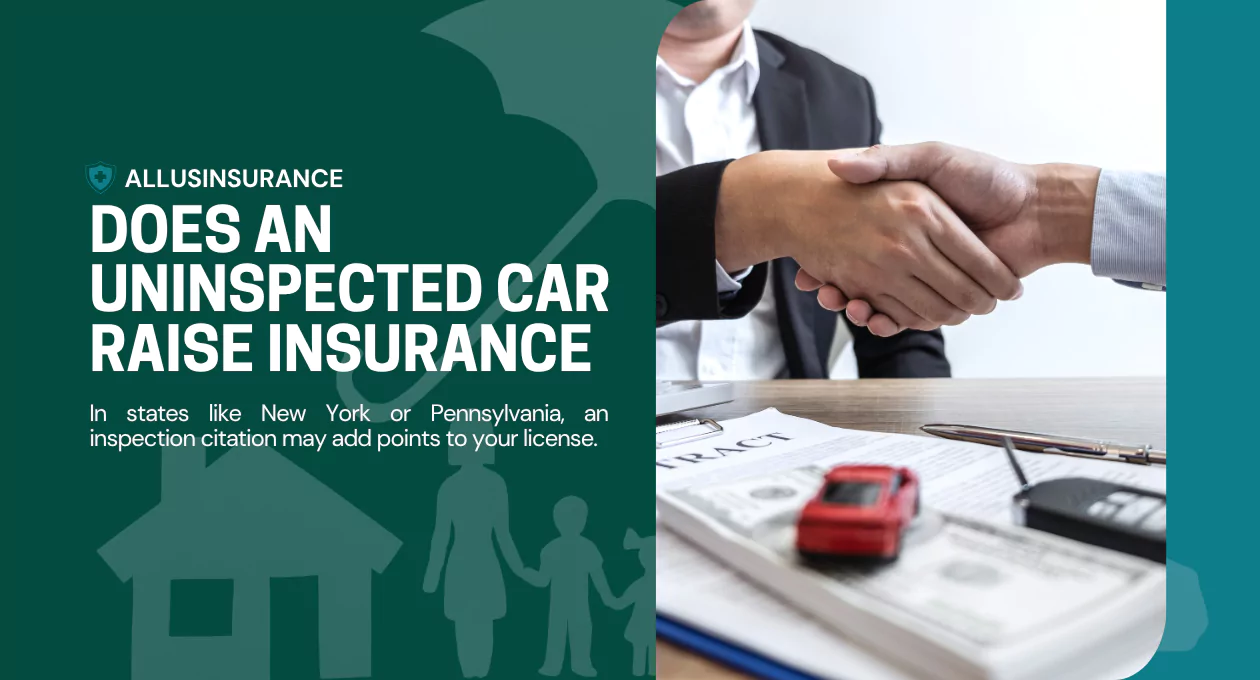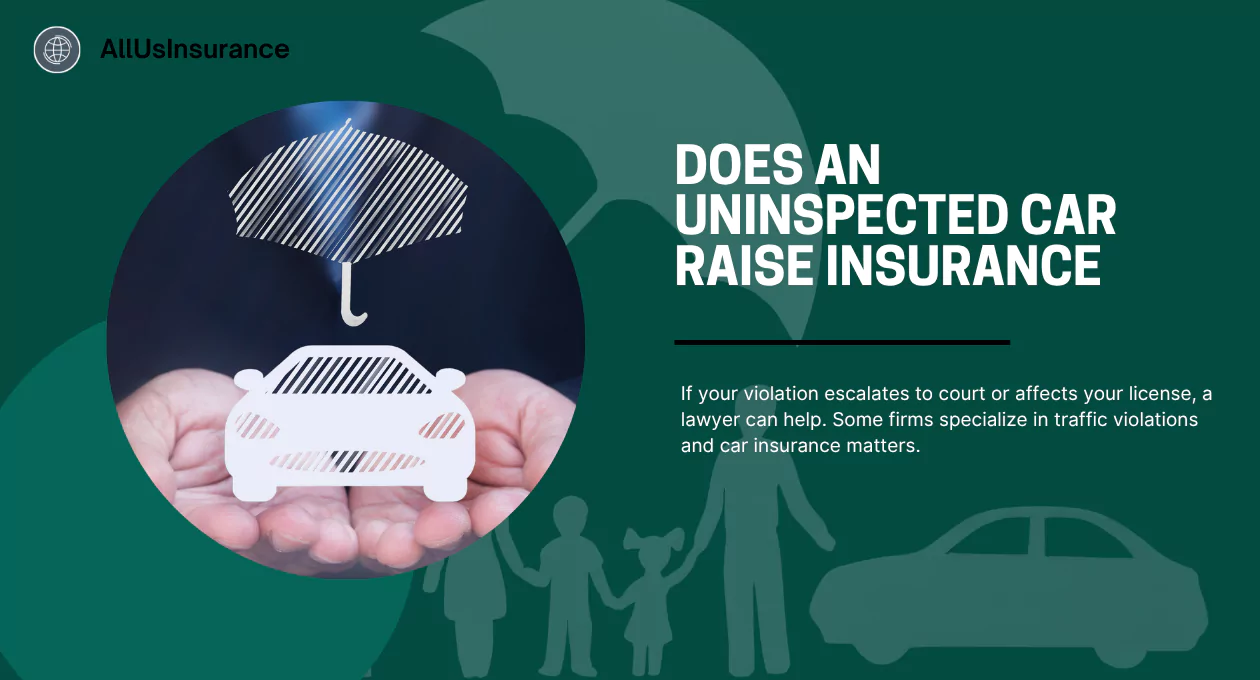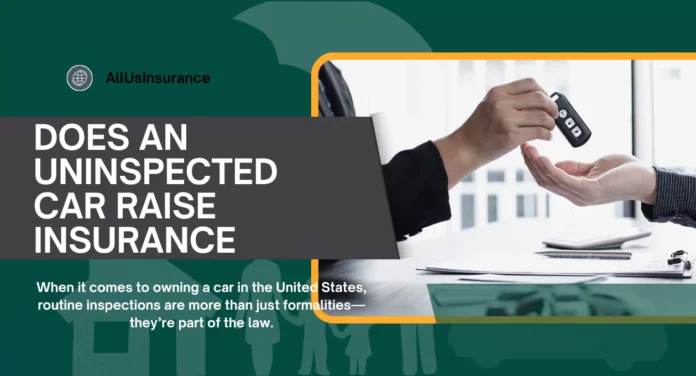When it comes to owning a car in the United States, routine inspections are more than just formalities—they’re part of the law. But many drivers still ask, does an uninspected car raise insurance? The short answer is yes, and the reasons might surprise you. An expired inspection sticker doesn’t just lead to fines; it can also impact your auto insurance rates, trigger claim denial, and even change how your insurer views your risk level.
Most states require regular vehicle inspection to ensure your car is safe and roadworthy. If you ignore these requirements, you may face higher premiums or trouble with future car insurance coverage. In some cases, insurers might limit your physical damage coverage or deny claims after an accident involving an uninspected car. Understanding how inspections connect to insurance policies is critical if you want to stay protected, legal, and financially safe on the road.
What Are Vehicle Inspection Stickers and Why Do They Expire?
Vehicle inspection stickers show that your car passed safety or emissions checks. These checks prove your car is safe to drive. In most states, the sticker expires in 12 months. Once it expires, you can get a ticket just by parking on the street. The rules change from state to state. But one thing stays the same: letting it expire can cost you.
When the sticker expires, some states may cancel your registration. If your car is involved in a crash, this might lead to a claim denial. Even worse, if the expired inspection affects the accident, the insurance provider requirements may lead to full or partial rejection of your claim. So it’s not just a sticker. It’s a baseline for claims and coverage.
Purpose of Vehicle Inspections in States Like Pennsylvania
States like Pennsylvania use inspections to check safety items like brakes, lights, tires, and emissions. It’s not about making money—it’s about public safety. Pennsylvania drivers must complete inspections every year. These inspections ensure your car isn’t a danger to others.
Skipping an inspection might mean your accident-prone vehicle is still on the road, which is risky. That’s why state inspection laws require strict checks. Failing to meet these rules makes your car a bigger risk to your insurer. That could bump up your risk classification, leading to higher rates or fewer coverage options.
Which States Require Regular Vehicle Inspections?
Some states require both safety and emissions inspections. Others require one or neither. Here’s a simple table:
| State | Safety Inspection | Emissions Test | Frequency |
| Pennsylvania | Yes | Yes | Annual |
| New York | Yes | Yes | Annual |
| Texas | Yes | Yes | Annual |
| California | No | Yes | Biennial |
| Florida | No | No | None |
In states where inspections are required, your car insurance claims can be affected if you skip them. Insurance policy activation may even be delayed if your car doesn’t pass the pre-insurance inspection in time.
What Happens If Your Vehicle Inspection Sticker Expires?
An expired sticker might not seem serious, but it can have legal and financial consequences. Law enforcement can issue a citation the moment they notice the expiration. Even if your car is parked, it can still be ticketed. If you’re pulled over, the fine can be higher, and your violation may be recorded.
That record matters to insurance companies. It affects how they view you during insurer investigation. If you’re seen as careless, they might label you a higher risk. This can impact your auto insurance rates and eligibility for discounts. Your insurer might even limit your physical damage coverage.
Penalties and Tickets for Expired Inspection Stickers
Penalties vary by state but usually range from $50 to $200 per violation. In some areas, repeat offenses can lead to points on your license or court appearances. You might even lose your registration temporarily.
Over time, even a $50 ticket can cost you much more. The reason? Your insurance provider requirements might change. They may add risk surcharges to your premium. Or you might lose eligibility for full coverage if your car has a pattern of violations. That’s a big deal for anyone with comprehensive coverage or collision coverage.
An Expired Vehicle Inspection Citation May Increase Your Car Insurance Rates
So, does an uninspected car raise insurance? Yes, especially if you get cited. A citation may flag you as a high-risk driver. When your policy renews, your insurer reviews your record. If they see an expired inspection citation, it may impact your premium.
The increase might be small at first. But over time, multiple issues can stack up. Insurance companies look at your whole profile—driving record, violations, location, and more. That expired sticker can push you into a worse risk classification, which makes you pay more for car insurance coverage.
How Do Vehicle Inspection Citations Affect Your Driving Record?
In states like New York or Pennsylvania, an inspection citation may add points to your license. Over time, these points can lead to license suspension. That creates even more problems when trying to get or keep used car insurance or liability-only coverage.

Every point on your record raises a flag for insurers. They may perform an insurer investigation before approving your next renewal. If they think you’re a risky driver, you could lose your eligibility for comprehensive coverage or get higher rates on collision coverage.
What Leads to a Failed Vehicle Inspection?
Many people fail inspections due to small, avoidable issues. Common reasons include worn-out tires, faulty brake lights, or a “check engine” light. Rusted frames and poor emissions are also red flags.
These problems can be fixed before the test, but many drivers wait too long. If your car fails the test and still ends up in a crash, your insurer may link the failure to the accident and deny your car insurance claims. That’s why it’s smart to maintain your vehicle year-round, especially if you have a high-mileage car or older vehicles and risk factors.
How Failed Inspections Can Affect Car Accident and Injury Claims
If your car fails inspection and you ignore it, you’re putting yourself at risk. Imagine you’re in a crash. If the investigation finds that failed brakes or emissions caused or worsened the accident, your insurer might not pay. That’s a claim denial waiting to happen.
Worse, your insurer might accuse you of hiding information. That leads to insurance fraud concerns, which can cause policy cancellation. This is why keeping your car inspected and in top condition is part of protecting your comprehensive coverage and collision coverage.
Case Studies: Real-World Impact on Insurance Due to Expired Inspections
Let’s look at some real stories. In Philadelphia, a driver forgot to renew their inspection. A week later, they had a minor crash. Because the expired sticker was noted on the police report, the insurance provider denied the claim.
In another case, a New York driver with a clean record got two expired sticker tickets in six months. Their auto insurance rates rose by 18% at renewal. Even though no accidents occurred, the insurance provider requirements treated the situation as a risk pattern.
| Case | State | Result |
| Crash + expired sticker | PA | Denied claims |
| 2 citations, no crash | NY | 18% rate increase |
Fighting a No-Inspection Ticket: Can You Win?
You can fight these tickets, but it depends on your state. If you can show that the inspection was scheduled or that the ticket was issued in error, the court might dismiss it. But even dismissed tickets can stay on your record, which can still affect insurance policy activation.
If you’re fighting a ticket, gather repair records and inspection receipts. Also, consult legal help if needed. Reducing fines or removing the violation may help lower future auto insurance rates and improve your risk classification.
Navigating Vehicle Inspections and Staying Compliant
To stay compliant, mark your calendar when you get a new sticker. Set reminders a month before it expires. Schedule repairs early if your car needs work to pass. This protects your record and helps you avoid insurance fraud concerns.
You can also use DMV reminder services. Apps and online portals help manage deadlines. These tools are useful if you’re managing a used car insurance policy or coverage for older vehicles and risk. Keeping up to date shows insurers you’re responsible, which helps your premiums.
Insurance Concerns: Comparing Providers Who Handle Inspection Citations Differently
Some insurers handle inspection issues better than others. Here’s a quick comparison:
| Company | Inspection Citation Impact | Notes |
| GEICO | Moderate | Higher if repeat violations |
| State Farm | Low to moderate | Considers entire profile |
| Progressive | High | May limit full coverage |
| Allstate | Moderate | Offers driver forgiveness |
If your insurer raises rates, think about switching insurance providers. Always compare insurance quotes before you switch. Use tools that consider inspection history to avoid future surprises.
Trusted Legal Representation for Vehicle Violation Cases
If your violation escalates to court or affects your license, a lawyer can help. Some firms specialize in traffic violations and car insurance matters. They may help reduce points or get the citation dismissed.

This is important for drivers with salvage title vehicles or those needing special car insurance coverage. A lawyer can also help protect you from denied claims and prove that your car’s condition didn’t affect an accident.
FAQs
What would make car insurance higher?
Your auto insurance rates can go up due to poor driving history, high-mileage car, accidents, vehicle inspection violations, or living in a high-risk area.
Can I get car insurance without an inspection?
Yes, but some insurers require a pre-insurance inspection, especially for used car insurance or physical damage coverage.
Does a new car raise your insurance?
Often, yes. A new car usually requires full coverage, including comprehensive coverage and collision coverage, which costs more.
Will insurance cover a non-registered car?
Most insurance companies won’t fully cover a non-registered car, and insurance policy activation may be delayed or denied.
Can you insure a car that is not registered yet?
Yes, in many states you can buy insurance first to register the vehicle, especially if the insurance provider requirements allow it.
Conclusion
So, does an uninspected car raise insurance? Absolutely. From fines and tickets to claim denial and rising auto insurance rates, the costs add up. Keeping your car inspected is simple but powerful. It protects your safety, your wallet, and your insurance profile.
Don’t risk it. Stay compliant. If you’re unsure about your inspection status, check it today. It’s one of the easiest ways to keep your insurance provider happy—and your comprehensive coverage secure.
For more amazing blogs keep visiting AllUsInsurance.



